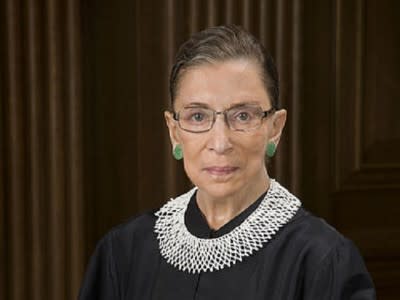Justice Ginsburg backtracks, again
Four days ago, the Supreme Court’s most publicly visible Justice, who has gained unusual star power – Ruth Bader Ginsburg, strayed again into non-legal controversy. And, on Friday she backtracked again, demonstrating anew the hazards of unguarded comments off the bench.
Justice Ruth Bader Ginsburg
In an interview with the Yahoo! broadcast personality Katie Couric during a book-promotion tour on October 10, the Justice was asked about the wave of protests over mistreatment of blacks, started by a professional football player (Colin Kaepernick, a quarterback for the San Francisco Forty-Niners), who chose to get down on one knee rather than stand for the playing of the National Anthem before games. The gesture has now been repeated across the land, even at high school sports events.
Here was the Justice’s reply: “I think it’s really dumb of them. Would I arrest them for doing it? No. I think it’s dumb and disrespectful. I would have the same answer if you asked me about flag-burning. I think it’s a terrible thing to do, but I wouldn’t lock a person up for doing it. I would point out how ridiculous it seems to me to do such an act…. If they want to be stupid, there’s no law that should be preventive. If they want to be arrogant, there’s no law that prevents them from that. What I would do is strongly take issue with the point of view that they are expressing when they do that.”
So far, the protests have not resulted in any legal controversies that might wind up before the Supreme Court, but Justice Ginsburg still reconsidered, and issued this statement Friday afternoon through the court’s public information office:
“Some of you have inquired about a book interview in which I was asked how I felt about Colin Kaepernick and other NFL players who refused to stand for the national anthem. Barely aware of the incident or its purpose, my comments were inappropriately dismissive and harsh. I should have declined to respond.”
It was not as unqualified an apology as she had made in July when she spoke even more dismissively and harshly of Republican presidential nominee Donald Trump.
Her apparent displeasure over the act of “flag-burning” recalls a 1989 decision by the Supreme Court, before she was a member, declaring that burning the American flag as a form of political protest was a form of “symbolic speech” protected by the First Amendment.
Legendary journalist Lyle Denniston is Constitution Daily’s Supreme Court correspondent. Denniston has written for us as a contributor since June 2011. Denniston has covered the Supreme Court since 1958. His work also appears on lyldenlawnews.com.
Recent Stories on Constitution Daily
Webster Bivens’ story – an update after a half-century
Race bias in the jury room: what’s the solution?
An independent U.S. agency’s independence gets it into trouble

